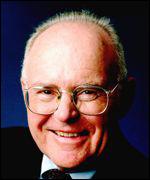Moore's Law and open source


"Look at this," she said in amazement. "When I bought my iPod it cost $250, and that was before it had video. Now here it is for $145 and it's the one with the video. I guess if you wait it always comes down."
What she was describing was Moore's Law, the idea that technology gets better and better, faster and faster.
First proposed by legendary Intel CEO Gordon Moore (above) in a 1964 Electronics article (years before he took the top chair), this simple description of how complexity can scale has ruled technology from that day to this.
But there are corollaries, perhaps less well-known to the general public but just as important to open source:
- Costs rise exponentially in line with complexity; and
- There is no Moore's Law of Software.
The first idea is often called Moore's Second Law. As chip designs get more complex, and the distance between circuit lines narrows, the cost of the gear needed to make the chip goes up in proportion.
Sure you can make it up on volume, but that capital requirement has been steadily squeezing out competitors -- PowerPC, Motorola, now AMD. The fastest-growing chip companies are now "fab-less," which does not mean they dress well but that they lack a fabrication plant or "fab" of their own. They share.
The second idea brings us finally to open source.
Despite advances in languages and compilers writing code is still hand work. My darling bride started with Assembler, went to Cobol, and now works with stuff like Java, but she still has to open up blue windows on her screen and hand type, then hand test, all the code she runs.
Because there is no Moore's Law of Software, and because Moore's Second Law makes devices increasingly complex, it's becoming just as hard to keep software proprietary as to own your own chip fabrication plant.
For the code base to advance it has to be shared. Just as many chip design houses may share a single fabrication plant with their orders, software development costs must be shared through open source in order to deal with increased complexity and the need for hand coding.
Would this move to share code costs through open source have happened without the Internet to drop collaboration and distribution costs down to near zero? Perhaps it would have taken longer to happen, but more likely it's also Moore's Law in action.
Which brings me, finally, to the news. Our own Matt Asay is deathly afraid that Nathan Myhrvold's Intellectual Ventures is going to scoop up all the loose IP around and hold it for ransom.
Maybe he can buy a lot, but there's always more. By sharing the burden open source can innovate around any gatekeeper. And if Myhrvold did somehow succeed economic necessity would eventually overwhelm legal niceties.
That's because Moore's Law comes from an engineer, not a lawyer. It is a law of the market, not of the courts.
And in America, market law is the highest law of all.